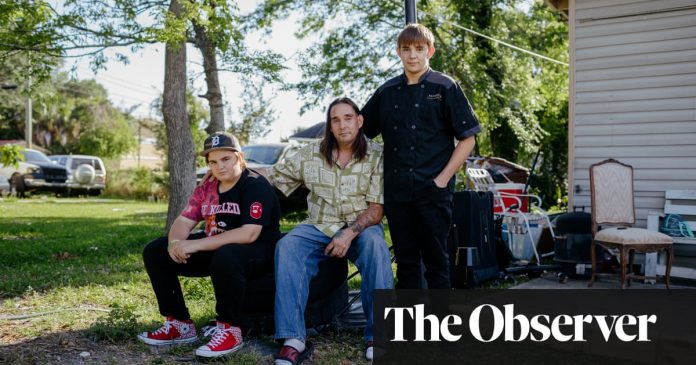The boulevard that snakes along the Biloxi coastline marks a crossroads in the city’s bid to reopen. To the north, towering hotels and casinos, lights dim, doors shut – a sign of a once-booming tourist industry that evaporated overnight last month. To the south, turquoise sea and white sand, hundreds of sunbathers enjoying recently reopened beaches.
In this medium-sized city, known for its hedonistic nightlife and its seafood, most reopening is being done by halves.
Earlier this week, the Republican governor, Tate Reeves, allowed restaurants to host dining at half-capacity, retail stores to reopen with restrictions and up to 20 people to gather in groups outside.
But one thing that has shown no sign of relaxing is the state’s number of Covid-19 cases. Three days before the governor’s latest guidance, Mississippi announced its highest number of daily cases and deaths. On Friday the tally stood at 396 deaths – far from the worst in America but certain to rise. Other states in the south, including Georgia, Texas and Florida, have also moved to open despite growing numbers of cases.
Like many conservative governors, Reeves has taken cues from Donald Trump, who has encouraged states to open in the face of White House taskforce guidance, which states that phased reopening should not commence until a 14-day decrease in the number of coronavirus cases has been seen.
Earlier this week, leaked guidance from the federal Centers for Disease Control and Prevention (CDC) indicated that the move to open up could lead by 1 June to a daily death toll across America of 3,000, an increase of 70% on the current rate.
In Biloxi, as the sun beat down and gulls squawked, some at the beach seemed to care little about the potentially fatal health outcomes associated with reopening too soon. Although many practised social distancing, others queued, unmasked and non-distanced, at the Life’s a Beach jet ski rental hut.
“I just don’t think we know enough about the virus,” said Shannon Carrou, an out-of-work casino worker. “We can’t stay at home forever.”
Mark Bresset, who works in transportation and had travelled 160 miles from central Mississippi, argued without evidence that the death toll had been “inflated”.
“People are going to die,” he said. “Period. I’m sorry. That’s not being cold or unaffected by it, that’s just the way things happen. For people in certain areas to always call on these [official death toll] numbers and generate fear just makes people more compliant to do what they’re told to do rather than be an individual and make a decision for themselves.”
‘A very scary time’
A few blocks into the sloped streets that surround the beach front, more nuanced views were easier to come by.
Lee Price, 45, who moved to the city two years ago to take up stable work as a cook, grimaced as he described the moment a month ago when Reeves announced a stay-at-home order – belatedly in the eyes of many – that led to him losing his job. Tens of thousands in Biloxi, where 25% of the economy depends on tourism, suffered the same fate.
“It was a very scary time, a very uneasy feeling,” said Price. “They sent us all home with boxes of food.”
Mississippi is America’s poorest state: before the pandemic, 20% lived below the poverty line and 600,000 of 2.9 million residents had limited access to healthy food.
Unemployment hit Price, a single father of three living paycheck to paycheck, like a punch to the gut. Having battled homelessness and addiction, he was reminded of such struggles. He has sat on the phone for hours each day, trying in vain to claim unemployment benefits. The state employment department has been overwhelmed by an average of 46,000 new claims a week. Price received a federal stimulus check, a one-off $1,200. It wasn’t enough.
He and his 14-year-old son have taken to mowing lawns for $20 a go and rely on the kindness of neighbours. Price is frank about his desire to return to work, despite the obvious risks.
“I don’t have time to worry about it,” he said. “I have to take care of my family. I just have to lay my faith in God.”
‘The sun is shining, summer is here’
Biloxi’s mayor, Andrew “FoFo” Gilich, a Republican, said reopening was being executed responsibly, and argued that the number of coronavirus cases in the area had already fallen. (He cited no city-specific data, but the county has reported no new deaths in the past week.)
“The sun is shining, summer is here,” he said. “You know, I’ve got things that need to be done in order to maintain our sanity and just our way of life.
“The cure [should not] be worse than the problem,” Gilich added – echoing a catchphrase Trump has used.
This week, the president acknowledged that reopening was likely to cost more lives.
“We have to be warriors,” he said on Wednesday. “We can’t keep our country closed down for years.”
Not all in Biloxi, which voted 64% for Trump in 2016, feel the same.
Lea Campbell, a frontline healthcare worker and community organizer with the Poor People’s Campaign, described the decision to reopen as “an ideological reflection of putting the economy before public health”.
“It’s irresponsible and it’s unproductive,” she said.
Campbell is a physical therapist at a hospital, working exclusively with Covid-19 patients, some of whom are recovering from critical illness. She acknowledged the caseload had gone down in recent days, but argued that the lull should reinforce the need to keep the city closed down.
“People are making a willful decision to put other people at risk, and I have seen the consequences of doing that,” Campbell said, as a gentle breeze wafted over her garden. “If they had seen what I have, I think their behaviour would be different.”






